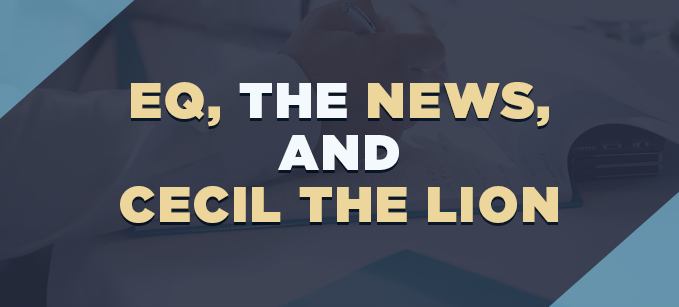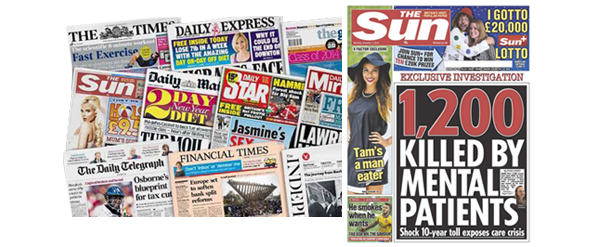EQ, the News, & Cecil the Lion

For many people nowadays, the news is the first thing they see in the morning before arriving at work and the last thing they check as they wind down before bed. In the UK, the BBC news website is visited by 20 million people five times a day. Even though news organisations are quick to remind us of their impartiality and balanced reporting standards, it’s a mistake to think that any news source is truly unbiased. At its core, bias is simply whatever filter is used to determine which 10 or 20 stories are most relevant, best or appropriate from the hundreds that could be selected for any given 6 O’clock broadcast.
News outlets, almost universally, have converged on the central criteria that consistently capture audience ratings and are therefore given highest priority in the line up: death and controversy. As the journalism saying goes, “If it bleeds, it leads.”

Suicide bombing kills twenty. Next story. Truck crash seriously injures six. Next story. Massive layoffs leave thousands jobless. Next story.
In all, it’s fairly depressing and difficult to know exactly how to process all this tragic information.
This is not to blame news outlets for feeding us these spoonfuls of shock. They operate in a system where the market determines prices and priorities. Getting angry with a news outlet for kicking off a bulletin with a bloody tragedy and rounding it off with the latest celebrity drivel makes about as much sense as complaining that McDonalds ought to serve better quality food. When the market is paying them millions for the current product, there’s no incentive to make a drastic change. Not unless we do.
The news, and tabloid journalism in particular, has a strangely addictive, junk-food-like quality. The question is, do our shock-and-controversy obsessed information diets hurt us? (Subtly if not overtly.)
According to philosopher and bestselling author Alain de Botton, watching the news can be psychologically risky, however it also has the potential to be an incredibly instructive tool in our lives. For De Botton, the news is more than just an information source; it’s a value-shaping system of bias that people use to make sense of the world and mature as human beings. We can either grow or shrink intellectually and emotionally as we process and debate both the mundane as well as the controversial.
It has been quite extraordinary to witness the “firestorm of hate” that has erupted over the killing of Cecil the lion in recent weeks. For many people, including those in our office, this was an event so disturbing and reprehensible, it brought emotions to the boil. For those following the story, you'll know the dentist has been forced to close his practice and currently remains in hiding.
We’ve seen related incidents of selfie-safari backlash in the recent past, but the intensity and scale of the reaction to Cecil’s death is unlike anything to date. It has sent an unambiguous moral message reverberating through society: Think twice before killing animals for fun, because there are serious social (and potentially economic) consequences.

The pro- vs. anti- hunting debate has been around for a long time, and now people are looking more closely at the merits of the respective arguments. The passion on both sides is there for all to see and the ubiquitous nature of social media allows for this conversation to spread in distance and ferocity — as oxygen feeds fire.
We saw, for example, one celebrity who was so enraged by the dentist's actions that she took to Twitter to post his work address. Mia Farrow, recognising that she had gotten a little carried away, later deleted the Tweet due to public pressure, in spite of the fact the address was publicly available information and only took seconds to find through a Google search. This raises questions about the best way to respond to an incident that ruffles our feathers.
Following any initially shocking event, something that comes in handy, the experts tell us, is self-regulation — an integral component of emotional intelligence. Self-regulation involves the ability to control or redirect disruptive impulses and moods and the propensity to suspend judgment and think before acting. Regulating does not mean ignoring or suppressing how you are feeling; it is about finding appropriate and mature ways to direct emotional energy into a productive endeavour.
Contrary to what some believe, emotional intelligence is not about putting on a smile, playing nice and avoiding conflict at all times. EQ has everything to do with how people use emotions to influence positive outcomes. By no means does anger need to be extinguished; merely expressed appropriately. Martin Luther King’s famous I Have a Dream speech is a prototypical example of an inspirational argument advanced by a blend of anger, passion and concern in the right degree.
How do we know when an emotional argument is expressed in the right degree?
Frankly, we don’t. It’s a struggle that philosophers will tell you has been going on for some time and is worth some valuable reflection.
“Anybody can become angry, that is easy; but to be angry with the right person, and to the right degree, and at the right time, for the right purpose, and in the right way, that is not within everybody's power and is not easy.”—attributed to Aristotle

Topics:
Emotional Intelligence
Theo Winter
Client Services Manager, Writer & Researcher. Theo is one of the youngest professionals in the world to earn an accreditation in TTI Success Insight's suite of psychometric assessments. For more than a decade, he worked with hundreds of HR, L&D and OD professionals and consultants to improve engagement, performance and emotional intelligence of leaders and their teams. He authored the book "40 Must-Know Business Models for People Leaders."

.png?width=374&name=Nutshell%20-%20Emotional%20Intelligence%20(Goleman%20Model).png)
/10%20of%20the%20best%20people%20to%20follow%20on%20linkedin.png?width=374&name=10%20of%20the%20best%20people%20to%20follow%20on%20linkedin.png)
We Would Like to Hear From You (0 Comments)